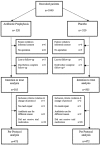The role of antibiotic prophylaxis in prevention of wound infection after Lichtenstein open mesh repair of primary inguinal hernia: a multicenter double-blind randomized controlled trial
- PMID: 15570201
- PMCID: PMC1356511
- DOI: 10.1097/01.sla.0000145926.74300.42
The role of antibiotic prophylaxis in prevention of wound infection after Lichtenstein open mesh repair of primary inguinal hernia: a multicenter double-blind randomized controlled trial
Abstract
Objective: To determine whether the use of prophylactic antibiotics is effective in the prevention of postoperative wound infection after Lichtenstein open mesh inguinal hernia repair.
Summary background data: A recent Cochrane meta-analysis (2003) concluded that "antibiotic prophylaxis for elective inguinal hernia repair cannot be firmly recommended or discarded."
Methods: Patients with a primary inguinal hernia scheduled for Lichtenstein repair were randomized to a preoperative single dose of 1.5 g intravenous cephalosporin or a placebo. Patients with recurrent hernias, immunosuppressive diseases, or allergies for the given antibiotic were excluded. Infection was defined using the Centers for Disease Control and Prevention criteria.
Results: We included 1040 patients in the study between November 1998 and May 2003. According to the intention-to-treat principle, 1008 patients were analyzed. There were 8 infections (1.6%) in the antibiotic prophylaxis group and 9 (1.8%) in the placebo group (P = 0.82). There was 1 deep infection in the antibiotic prophylaxis group and 2 in the placebo group (P = 0.57). Statistical analysis showed an absolute risk reduction of 0.19% (95% confidence interval, -1.78%-1.40%) and a number needed to treat of 520 for the total number of infections. For deep infection, the absolute risk reduction is 0.20% (95% confidence interval, -0.87%-0.48%) with a number needed to treat of 508.
Conclusions: A low percentage (1.7%) of wound infection after Lichtenstein open mesh inguinal (primary) hernia repair was found, and there was no difference between the antibiotic prophylaxis or placebo group. The results show that, in Lichtenstein inguinal primary hernia repair, antibiotic prophylaxis is not indicated in low-risk patients.
Figures
References
-
- Bay-Nielsen M, Kehlet M, Strand L, et al. Quality assessment of 26304 herniorrhaphies in Denmark: a prospective nationwide study. Lancet. 2001;358:1124–1128. - PubMed
-
- Hair A, Duffy K, McLean J, et al. Groin hernia repair in Scotland. Br J Surg. 2000;87:1722–1726. - PubMed
-
- Nilsson E, Haapaniemi S, Gruber G, et al. Methods of repair and risk for reoperation in Swedish hernia surgery from 1992 to 1996. Br J Surg. 1998;85:1686–1691. - PubMed
-
- Nyhus LM, Alani A, O'Dwyer PJ, et al. The problem: how to treat a hernia. In: Schumpelick V, Nyhus LM, eds. Meshes: Benefits and Risks, 1st ed. Berlin: Springer-Verlag, 2004:3–30.
-
- EU Hernia Trialists Collaboration. Mesh compared with non-mesh methods of open groin hernia repair: systematic review of randomized controlled trials. Br J Surg. 2000;87:854–859. - PubMed
Publication types
MeSH terms
Substances
LinkOut - more resources
Full Text Sources
Medical


